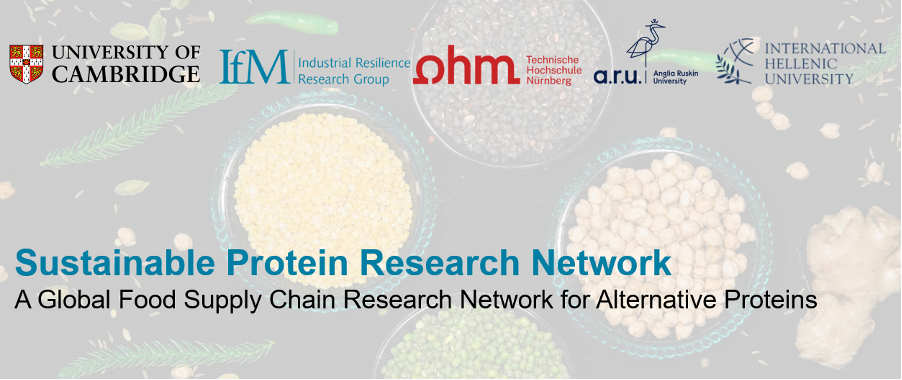Sustainable Protein Research Network

Introduction
The Sustainable Protein Research Network (SPRN) is a European-founded research network focused on transforming the alternative protein (AP) supply chain. SPRN leverages interdisciplinary collaboration to enhance the scalability, resilience, and sustainability of protein sources alternative to traditional meat and dairy.
Why Now
Recent advancements in alternative protein research and the urgency for sustainable food systems underscore the importance of SPRN’s mission. Alternative proteins represent a critical solution, but require a dedicated, interdisciplinary approach to overcome obstacles in the supply chain management field, such as:
- Scale-up challenges.
- High production costs and supply chain inertia.
- Data fragmentation affecting supply chain resilience, visibility and transparency.
- Policy inconsistences and regulatory issues.
- Lack of consumer trust in novel products.
- Knowledge gaps about sustainability and health impacts.
- Cultural and socioeconomic barriers.
Vision
We envision a future food system which is resilient and ensures equal access to nutritious food, supports rural livelihoods and fair wages, relieves poverty, protects nature, and is ethical and humane for everyone - regardless of species.
Mission
Our mission is to shift the timeline of widespread awareness, acceptance and adoption of APs across the supply chain from 2050 to 2035 by:
- Deepening understanding and advancing solutions into AP supply chains, considering economic, environmental, and social factors.
- Driving innovation in product and process development to advance the alternative protein industry.
- Promoting the adoption of cutting-edge technologies for a more resilient and sustainable food system.
Our Focus Areas
- Supply Chain Management
- Product and Process Development
- Technology Adoption
- Interdisciplinary Collaboration
Main External Activities
Conducting State-of-the-Art Research
- Mapping the landscape to identify key players, emerging technologies and market opportunities within AP supply chains.
- Modelling AP supply chain for scenario analysis stress-testing.
- Identifying resilience and cost trade-offs.
Disseminating Latest Research
- Supply chain workshops (i.e., Annual Agri-Food Supply Chain Resilience Workshop in May at Cambridge)
- Industry visits
- Policy engagement workshops
- Case study development
- Course development
- Online PhD conferences
Project Consortium Building and Matchmaking for Interested Stakeholders in AP Ecosystems
Main Internal Activities
Encourage Collaborative Funding Opportunities
- Facilitate funding opportunities through open network calls for companies, policymakers, and researchers.
- Leverage seed funds (Network Plus calls) to support events and initiatives.
Expand Global Network Reach
- Strategically grow the network into emerging regions such as India, Brazil, African countries, and Australia, where alternative protein research and innovation is growing slowly.
Promote Interdisciplinary Engagement
- Ensure that the network takes a holistic and interdisciplinary approach, integrating diverse fields and stakeholders to advance innovation in the alternative protein sector.
Founding Members
- Professor Helen Rogers (Ohm University, Germany)
- Ms Mariel Alem Fonseca (University of Cambridge, United Kingdom)
- Dr Mukesh Kumar (University of Cambridge, United Kingdom)
- Dr Naoum Tsolakis (International Hellenic University, Greece)
- Professor Manoj Dora (Anglia Ruskin University, United Kingdom)
- Mr Garry Clawson (University of Cambridge, United Kingdom)
10 Reasons to Join Our Network
- Collaborate with leading experts in the field of supply chain management
- Access to exclusive industry insights
- Leverage funding and investment opportunities
- Scale supply chains faster
- Strengthen food supply chain resilience
- Drive policy and regulatory change
- Be at the forefront of innovation and technology commercialisation
- Be part of the global community of alternative proteins
- Contribute to SDGs
- Shape the future of food supply chains
Get Involved
We invite researchers, industry leaders, and policymakers to join us in building a resilient and sustainable future for alternative proteins by registering in the following link: https://forms.gle/NV8UALL8X5ALWPqGA
Contact
2024-2025 Network Chair: Professor Helen Rogers (helen.rogers@th-nuernberg.de)
2024-2025 Network Coordinator: Ms Mariel Alem Fonseca (ma810@cam.ac.uk)
Publications
- Journal Article "Unlocking the market potential of macroalgae in alternative protein supply chains: Enablers and inhibitors" (https://www.sciencedirect.com/science/article/pii/S266615432500910X?ssrnid=5349110&dgcid=SSRN_r…)
- Teaching Case "Quorn Foods: The Road to Supply Chain Resilience" (Quorn Foods: The Road to Supply Chain Resilience" (https://www.iveypublishing.ca/s/product/quorn-foods-the-road-to-supply-chain-resilience/01tOF00000A…)
- Journal Article "Plant-based Food Supply Chains: Recognising Market Opportunities and Industry Challenges of Pea Protein"(https://www.sciencedirect.com/science/article/pii/S2772502224000520)
- Book Chapter "Cultivated Meat and Bioeconomy in Tandem: Unlocking the Sustainability Implications of Transformative Food Supply Chains" (https://link.springer.com/chapter/10.1007/978-3-031-55968-6_17)
For further information please contact:
- Journal Article: Unlocking the market potential of macroalgae in alternative protein supply chains: Enablers and inhibitors
- Teaching Case: Quorn Foods: The Road to Supply Chain Resilience" (Quorn Foods: The Road to Supply Chain Resilience
- Journal Article: Plant-based Food Supply Chains: Recognising Market Opportunities and Industry Challenges of Pea Protein
- Book Chapter: Cultivated Meat and Bioeconomy in Tandem: Unlocking the Sustainability Implications of Transformative Food Supply Chains









